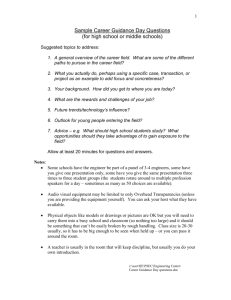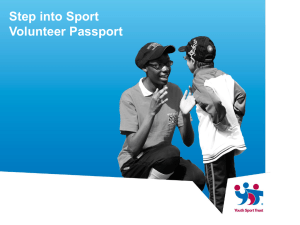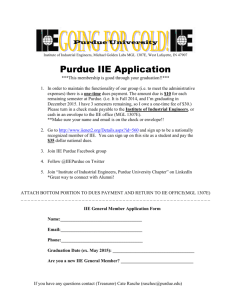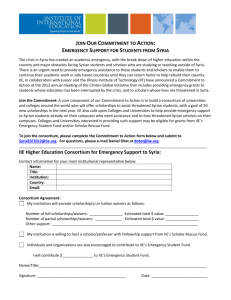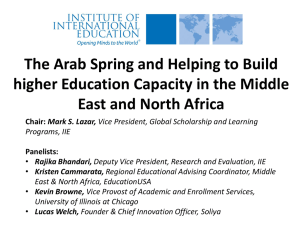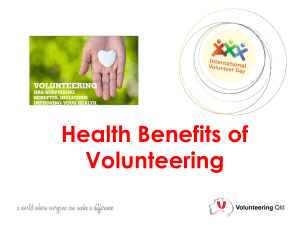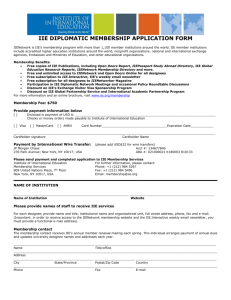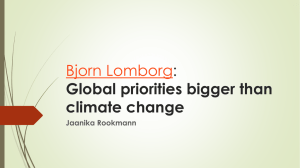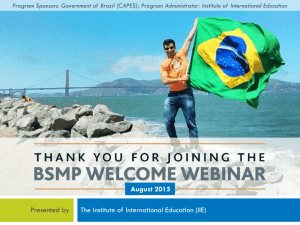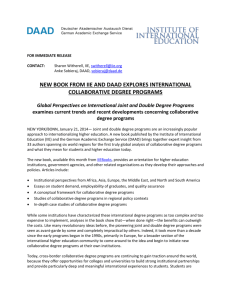Addressing the Challenge of IEs Helping Non-Profits - X
advertisement
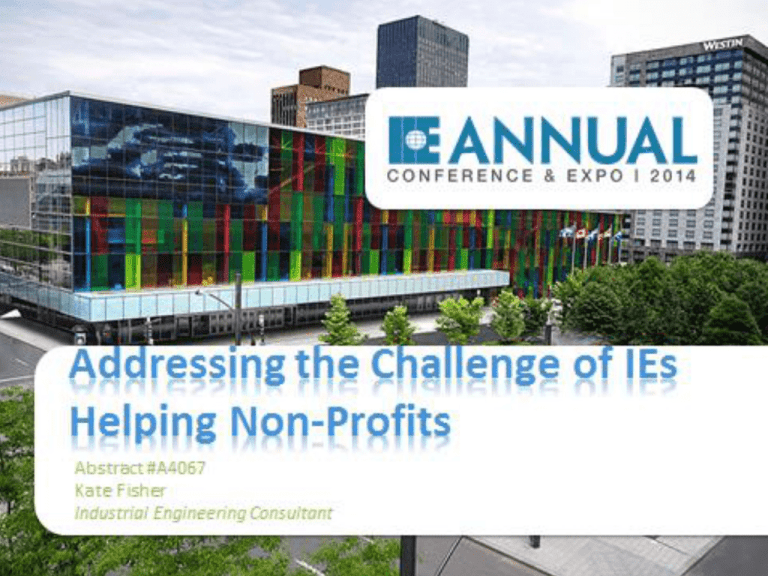
1 Kate Fisher Industrial Engineering Consultant West Monroe Partners, LLC. Columbus, OH IIE Annual Conference 2014 – Montreal How to find and initiate non-profit relationships Getting them on-board with the idea of change Ways to actually help them using IE skills [given typical working/life constraints] Challenges faced throughout this process Managing the relationship moving forward My experience: WMP pro-bono project with the furniture bank Organizing and executing annual IIE volunteering (2 years) Volunteering coordinator for WMP office Project work with the Red Cross Personal volunteering with Red Cross and “JA” Class project on business plans for non-profits IE skills are very valuable Heard many IEs talk about it… but hard to actually get things going [personally and what I’ve observed] >6 months to get everyone on board for the pro bono project Yet, people want to help! Emails from Pakistan and Saudi Arabia about the IIE event! So I wanted to share what I’ve found so maybe others can have success with this When we volunteered they mentioned tight on space I called to talk about it ~1year later They had just hired an architecture firm To evaluate how much space they need And what they can do with their current space Also what they need if they were to find or build a new facility Their biggest problem: Warehouse space Main facility space vs. [unused] other warehouse Other problems: Product flow Production planning Scrambling when they faced shortages Pick anything up and “find space” in main facility How I found mine: Cold calling (Red Cross) Volunteering there (Furniture Bank) Other organizations in touch (IIE Events) How to initiate: Develop a contact(s) Establish if there’s a need Offer help ▪ Both ask what they need and tell them what you could offer Follow-up… a lot! Where to get the time for all this? In between meetings, beginning or end of business day, lunch, doctor waiting rooms… etc. Establish what they need, timeline, and how to do it Just like any other statement of work Determine the best approach [for them]: Do it yourself? Get your company involved? Go through an organization (like TapRoot)? How to get them to agree to the help: Sometimes have to convince and be persistent ▪ …and sometimes they've been waiting for you! But occasionally you might have to let it go ▪ Red Cross and stepping on toes… ▪ Local NPR station didn’t return calls It’s probably not too late even if already getting help…. Find time to commit and let them know that up front Stick to it like any other obligation (coaching, tutoring, etc.) Determine the best approach [for YOU] (Yourself; Your company; External Organization) Getting my company involved was best for us… Pay some, give some? ▪ Having them pay some can help drive the timeline ▪ Help to justify to the company BUT issue of paying less than full amount… The non-profit being willing to pay helped start the conversation ▪ Though we ended up covering it after all ▪ The company got several benefits [mentioned later] Lesson Learned: Don’t assume they don’t have money to spend… Lack of time/money/resources to put towards a normal project plan Can do an official project like Taproot, but harder to get involved with When I came upon the furniture bank they needed help NOW Community money drives non-profits Means longer timelines All gearing up for a community “ask” (not implementation) Board of Directors (people like you!) Volunteers as workers Being careful about what to put on the SOW [$] Before we found them they hired an architecture firm Looking at walls… not the process or the current capability Previous “Helpers” (like us!) Material touched many hands, many languages, coordination! Not only limited time and money Key Questions Limit interference with the process ▪ They can’t shut down! Yet they really need your help… ▪ How to start/decide what to go with? ▪ Can’t collect the data you feel comfortable collecting? ▪ How to implement? When to work with them? ▪ When to use best judgment and not? Don’t promise too much But worst case you can help them help themselves Be up-front on your plate and if it can fall off* What they can reasonably expect you to commit Put out there what you can offer Providing your expertise, IE tools and potentially some analysis of their biggest issues They might see how you can help better than you! Establish what their biggest issues are See the key things they want to address Find out their timeline Suggest how you could help them get there Help them with their current needs Acted as “process voice” at architecture meetings Overall strategy for the various groups involved Strategize for how to help with future needs Initiated the Pro Bono project Universal agreement on the project process ▪ Signed SOW, payment or other agreement, timeline Follow through Follow-up Similar to the idea of the “triple bottom line” Evaluate beyond the bottom line: Examples of other prime considerations: ▪ Location within 80% of clients in the city and bus line even though neighborhood wasn’t great and property wasn’t perfect for their need ▪ There is better property elsewhere but wouldn’t be able to maintain the customer base ▪ How to take this info account? Value of better inventory management vs. labor cost “Disrupting” stakeholders who aren’t on board Red Cross example when stopped returning calls/emails The demand to be treated equal* Especially if paying anything But they have business needs too… Moving forward with the non-profit Don't have to do Pro Bono ▪ Can volunteer labor or money too [one time or long term] ▪ Mixture of everything Staying in touch, trying to keep the relationship alive Company justification Beyond “the good” Could get recognition [OK to ask for it!] ▪ Community award ▪ Press release ▪ Case study Potential tax advantages Difficulties with the architecture firm project After 5 months they had a layout for a $2MM building… … that didn’t tell them anything about how to improve NOW They asked us to explore what they need to meet levels of “clients served” To be used to valuate a “community ask” They had offered to pay up to $10,000 We decided to do fully pro-bono – but this helped the conversation … They’re going to honor us at their biggest annual event this week! Recommendation results as of 5/15/14… Physical changes examples: ▪ Evaluated racking feasibility and cost ▪ Evaluated cross-docking Layout example: ▪ Circular flow Inventory management example: ▪ Inventory cycle How I was able to do it/plan it: Tried before, much easier with company’s support 1+1+1 WMP Fellowship IIE Volunteering $$ Example If you own a business or make decisions: Good for gaining employees [looks good!] Good for maintaining employees Reputation for the company in the community How to get your organization to let you: We’re all here at the conference… Convey value and meaning to your company If you can’t?... Still very possible on your own Thank you for coming! Please contact me with any questions: kfisher@westmonroepartners.com or admkatfish@gmail.com
![IIE Continuing Education Benefits You and Your Company[1]](http://s3.studylib.net/store/data/007679605_2-bb634887790654c6045e40acc116701d-300x300.png)
